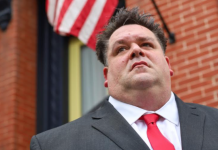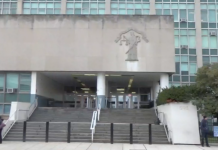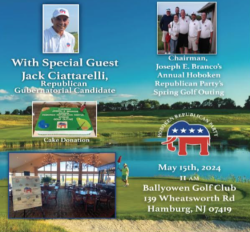Members of the New Jersey Legislative Black Caucus weighed the pros and cons of legalizing marijuana during a hearing at the Cityline Church in Jersey City this morning.Â
[fve]https://www.youtube.com/watch?v=C50n4d6rgnc&feature=youtu.be[/fve]
Speaking on behalf of a minority advocacy group in the marijuana industry, California Minority Alliance Co-Founder and Co-Chairman Virgil Grant III pointed out that over half the country has already legalized marijuana and it’s time for New Jersey to follow suit.
“If you look at the map that I will hand over, over 30-something states have some form of legalization – that’s over half the country that’s already said yes on this. It’s not going back,” he stated.
“The question is: how do you want it to look in your town? If it’s here. If it’s here, how do you want to regulate it. If it’s here, how do you want to control it, how do you want to educate your community? These are the conversations you need to have, not the conversations about we don’t want it.”
Grant went to prison for six years after his medical cannabis operation was raided in 2008, but he remains one of the most active members of the marijuana industry on the West Coast since his release.
State Senator Ronald Rice (D-28), the chair of the NJ Legislative Black Caucus, spoke at length about the social justice implications of legalizing the drug.
“For someone to say ‘we will only let you out of jail if you sign a legalization bill,’ then I’m saying you’re holding me hostage. Now if you understand plantation mentality: that’s plantation mentality,” Rice calmly said.
“If you understand the war on drugs, I could give a whole lecture on the war on drugs – even before Ron Reagan in 1982 – this is a detrimental law the way it’s being presented to us. I can show you in New Jersey, where the sponsor came back up with the legalization bill and said this is about social justice.”
Rice expressed disappointment that the same stance was not taken on the subject of expungement, later noting that marijuana dispensaries could become prime locations for violent crime due to the amount of money involved.
State Senator Nicholas Scutari (D-22) introduced a bill in May and reintroduced it last month.
The bill would allow possession and personal use of marijuana of up to one ounce for adults over the age of 21.
Additionally, the legislation would create an enforcement agency, a tax on weed sales, as well as a licensing system for growers and retailers.
Responding to a question from Assemblywoman Angela McKnight (D-31) about the possible benefits of marijuana for pain management, Smart Approaches to Marijuana (SAM) President Kevin Sabet said there is sufficient research to show that marijuana is still a gateway drug.
“You really have to understand both sides of the gateway issue, but I have never met a parent, I’ve unfortunately met hundreds, who lost a son or daughter to the opioid epidemic who did not say that it started with just a little bit of pot,” Sabet exclaimed.
On the topic of employers potentially still drug testing workers for marijuana even if it’s legalized, state Senator Nia Gill (D-34) noted the important distinction between personal responsibility vs. governmental responsibility.
State Senator Sandra Cunningham (D-31) and Assemblywoman Angelica Jimenez (D-32) also joined the panel at separate times during the three-hour public session
In January, Gov. Phil Murphy (D) signed an executive order calling for a 60-day review of the Garden State’s medical marijuana program.
On the campaign trail, Murphy called for legalizing marijuana for recreational use to bring much needed added revenue into the state, but that effort appears to be stalled as both Democratic and Republican lawmakers remain unconvinced this is the right move to make (h/t NJ Advance Media).











The smartest approach to marijuana begins with honest, accurate, balanced information.
Nearly every claim by SAM (Smart Approaches to Marijuana) still disputed in the scientific community. This makes every monetary claim in their anti-legalization reports groundless for the most part. Also in their reports they do not even attempt to include any data regarding positives of legalization and where money will be saved (far less prosecution and incarceration for sales/possession, etc).
SAM founders/leaders have strong ties to the addiction treatment industry which will greatly benefit from forced court-related treatment referrals that inevitably occur under prohibition. This is likely part of the reason why they fight legalization.
The gateway concept is frequently brought up. Over the years I have collected much information on the subject.
If prohibition has any effect in this regard, it makes cannabis a gateway to other illicit drugs.
The gateway drug theory, that a unique pharmacological effect of cannabis causes the use of hard drugs, has been discredited by the many peer reviewed studies which have examined it.[1,2,3,4,5,6,14,15,19,24]
If the gateway theory were to have any merit, then alcohol and tobacco would be the true gateway drugs as nearly all have tried these before cannabis.[1,6,23] There are many factors that determine which illicit substance will be used first, including availability and culture. In Japan, where cannabis use is not popular and largely frowned upon, 83% of illicit drug users did not use illicit cannabis first.[19] In the U.S., since cannabis is by far the most popular and available illegal recreational substance, it is unlikely that one would find many illicit hard drug users who did not encounter and use illicit cannabis first.[1] This does not mean that cannabis caused their hard drug use. Rather, it was their pre-existing interest in recreational substances combined with their willingness to try illicit substances and cannabis was simply, and predictably, the first encountered.[3,14,19]
On a related note, studies have shown that cannabinoids can help treat those addicted to hard drugs and alcohol, and that it is an “exit drug” for some.[4,7,18,22,25]
If anything, the prohibition of cannabis makes the hard drug problem worse. Once someone breaks the law to try the very popular and relatively safe drug cannabis, their reluctance to try another illegal substance diminishes. This is both because of their newly increased doubts of government honesty regarding the harmful effects of those substances as well, and their newly reduced respect for laws against drugs in general. Cannabis prohibition also connects cannabis consumers to the hard drug market. Imagine if beer merchants also sold heroin, cocaine and meth. This is the situation that the prohibition of cannabis creates for its consumers. It places a very popular substance into these otherwise unpopular markets, strengthening them and expanding their reach. Also, with no legal avenue to resolve disputes, cannabis prohibition increases the crime associated with these markets.
There are a multitude of factors that determine who will use which drug, when and how often. These factors include genetics, environment, personal factors, and likely others yet to be discovered. Efforts to prevent hard drug abuse are undermined and resources misspent when gateway theory is accepted as valid. A recent extensive review on the subject concluded that: “The promotion of the erroneous gateway theory ultimately does the public a disservice, including the hindering of intervention.”[19]
Regardless, one major concern is that relaxed laws will lead to significantly increased teen usage, but this has not been the case.[20] Legalizing medical cannabis in the U.S. has not increased cannabis usage in teens.[8,9,10,11,21] Decriminalization does not result in increased cannabis consumption, for any age group, except for a small, temporary increase during the first few years.[12,13] Portugal eventually saw reduced adolescent cannabis use after decriminalizing all drugs in 2001.[17]
SOURCES:
1. Joy et al. Marijuana and Medicine: Assessing the Science Base. Institute of Medicine. 1999.
2. Morral et al. Reassessing the marijuana gateway effect. Drug Policy Research Center, RAND. Addiction. 2002.
3. Cleveland HH & Wiebe RP. Understanding the association between adolescent marijuana use and later serious drug use: gateway effect or developmental trajectory? Dev Psychopathol. 2008.
4. O’Connell TJ & Bou-Matar CB. Long term marijuana users seeking medical cannabis in California (2001–2007): demographics, social characteristics, patterns of cannabis and other drug use of 4117 applicants. Harm Reduction Journal. 2007.
5. Wen et al. The Effect of Medical Marijuana Laws on Marijuana, Alcohol, and Hard Drug Use. The National Bureau of Economic Research. 2014.
6. Tristan et al. Alcohol as a Gateway Drug: A Study of US 12th Graders. Journal of School Health. 2012.
7. Oliere et al. Modulation of the Endocannabinoid System: Vulnerability Factor and New Treatment Target for Stimulant Addiction. Front Psychiatry. 2013. Review.
8. Choo et al. The Impact of State Medical Marijuana Legislation on Adolescent Marijuana Use. Journal of Adolescent Health. 2014.
9. Lynne-Landsman et al. Effects of state medical marijuana laws on adolescent marijuana use. Am J Public Health. 2013.
10. Harper et al. Do medical marijuana laws increase marijuana use? Replication study and extension. Ann Epidemiol. 2012.
11. Anderson et al. Medical Marijuana Laws and Teen Marijuana Use. IZA 2012.
12. Williams J, Bretteville-Jensen AL. Does liberalizing cannabis laws increase cannabis use? J Health Econ. 2014.
13. Single EW. The impact of marijuana decriminalization: an update. J Public Health Policy. 1989.
14. Tarter et al. Predictors of Marijuana Use in Adolescents Before and After Licit Drug Use: Examination of the Gateway Hypothesis. The American Journal of Psychiatry. 2006.
15. Van Gundy K & Rebellon CJ. A Life-course Perspective on the “Gateway Hypothesis”. J Health Soc Behav. 2010.
17. Hughes C E and Stevens A. What Can We Learn From The Portuguese Decriminalization of Illicit Drugs?. Brit J Criminol. 2010.
18. Reiman A. Cannabis as a substitute for alcohol and other drugs. Harm Reduct J. 2009.
19. Vanyukov et al. Common liability to addiction and “gateway hypothesis”: theoretical, empirical and evolutionary perspective. Drug Alcohol Depend. 2012. Review.
20. Simons-Morton et al. Cross-national comparison of adolescent drinking and cannabis use in the United States, Canada, and the Netherlands. Int J Drug Policy. 2010.
21. Hasin et al. Medical marijuana laws and adolescent marijuana use in the USA from 1991 to 2014: results from annual, repeated cross-sectional surveys. The Lancet. 2015.
22. Bisaga et al. The effects of dronabinol during detoxification and the initiation of treatment with extended release naltrexone. Drug Alcohol Depend. 2015.
23. Barry et al. Prioritizing Alcohol Prevention: Establishing Alcohol as the Gateway Drug and Linking Age of First Drink With Illicit Drug Use. J Sch Health. 2016.
24. Degenhardt et al. Evaluating the drug use “gateway” theory using cross-national data: consistency and associations of the order of initiation of drug use among participants in the WHO World Mental Health Surveys. Drug Alcohol Depend. 2010.
25. Walsh Z et al. Medical cannabis and mental health: A guided systematic review. Clin Psychol Rev. 2017. Review.